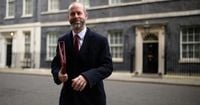LONDON — The U.K. government is poised to impose tariffs on American goods if it cannot secure an exemption from U.S. President Donald Trump’s recently announced trade tariffs. This decision comes in response to Trump’s declaration of a 10 percent tariff on U.K. goods imported into the U.S., effective from April 5, 2025, alongside a 25 percent duty on car imports that began on April 3, 2025. British Trade Secretary Jonathan Reynolds emphasized that the U.K. would “not hesitate to act” should negotiations fail.
In a strategic move, the U.K. has initiated a formal process to retaliate against these tariffs, with Reynolds stating that this step is necessary to keep all options on the table. The trade department has published a comprehensive 417-page list of U.S. products that could be subject to tariffs, which includes a wide array of items such as meat, fish, dairy products, whiskey, rum, clothing, motorcycles, and musical instruments. The list is designed to help identify which products would cause the least harm to U.K. companies if tariffs were imposed.
Reynolds noted that the tariffs, if implemented, could affect well-known brands like Jack Daniel’s whiskey and Harley-Davidson motorcycles. This marks the first time the U.K. government has explicitly threatened retaliatory action against the U.S., reflecting the seriousness of the trade tensions that have arisen.
During a session in the House of Commons, Reynolds outlined the government’s approach, stating that officials would consult with businesses over the next four weeks, until May 1, 2025, to gather input on potential retaliatory measures. He explained, “To enable the U.K. to have every option open to us in future, I am today launching a request for input on the implications for British businesses of possible retaliatory action.”
The business secretary also indicated that if a trade deal with the U.S. is reached that lifts the tariffs, the request for input would be paused, and any retaliatory measures would be lifted. “If we are in a position to agree an economic deal with the U.S. that lifts the tariffs that have been placed on our industries, this request for input will be paused, and any measures flowing from that will be lifted,” Reynolds assured MPs.
Despite these preparations, the U.K. government remains hopeful about reaching a swift economic deal with the U.S. Downing Street has indicated that negotiations are at an “advanced stage.” A spokesperson for the prime minister stated, “Our focus is to negotiate this economic deal with the U.S., but not taking any options off the table, and we’ll continue to respond in a way that serves U.K. interests.”
On the evening of April 2, Trump unveiled his sweeping tariff plans, which experts predict will reshape the global economic landscape. Notably, U.K. ministers were encouraged by the fact that the 10 percent tariff is the lowest imposed by the U.S. compared to the 20 percent tariff on the European Union.
In a meeting at Downing Street on April 3, 2025, Labour leader Keir Starmer convened heads of business to discuss the potential economic impact of U.S. tariffs. Starmer acknowledged the challenges posed by the tariffs but expressed confidence that ministers would respond with “cool and calm heads.”
Prime Minister Boris Johnson addressed business officials, acknowledging Trump’s actions as a reflection of his national interests. He stated, “Today, I will act in Britain’s interests with mine,” emphasizing that while the tariffs present a challenge, the U.K. is in a better position than many other countries.
Johnson defended his decision against immediate retaliation, suggesting that it is more prudent to negotiate for a favorable outcome rather than rush into a trade war. “I don’t think we should jump straight into a trade war,” he remarked. “I think it is better if we’re able to negotiate a better outcome, and that’s what we are attempting to do.”
However, the readiness to prepare retaliatory action could still provoke anger from the Trump administration. U.S. Treasury Secretary Scott Bessent warned countries against retaliation, stating, “as long as you don’t retaliate this is the high end of the number.” In response to Bessent’s comments, Reynolds reiterated the government’s commitment to keeping options open while still focusing on securing a deal.
Reynolds expressed optimism about the potential for a trade agreement, stating, “Whilst we have a chance of making the relationship between the U.K. and U.S. even stronger than it is, the message I get very strongly from businesses is remain at the table, don’t overreact, stick with the calm-headed approach the government has had to date and we’re going to do that.”
Despite the ongoing negotiations, tensions over food safety standards have resurfaced. Reynolds revealed that Trump’s team has raised objections regarding the U.K.’s food safety regulations, particularly concerning the ban on U.S. chlorine-washed chicken and hormone-treated beef. “We have a food standards regime which we’re very committed to in the U.K. which they have some objections to,” he explained during a BBC Breakfast interview.
As the U.K. navigates this complex trade landscape, the government remains committed to protecting its interests while seeking a resolution that benefits both nations. The coming weeks will be critical as officials consult with businesses and work towards a potential agreement that could alleviate the newly imposed tariffs and foster stronger economic ties between the U.K. and the U.S.





